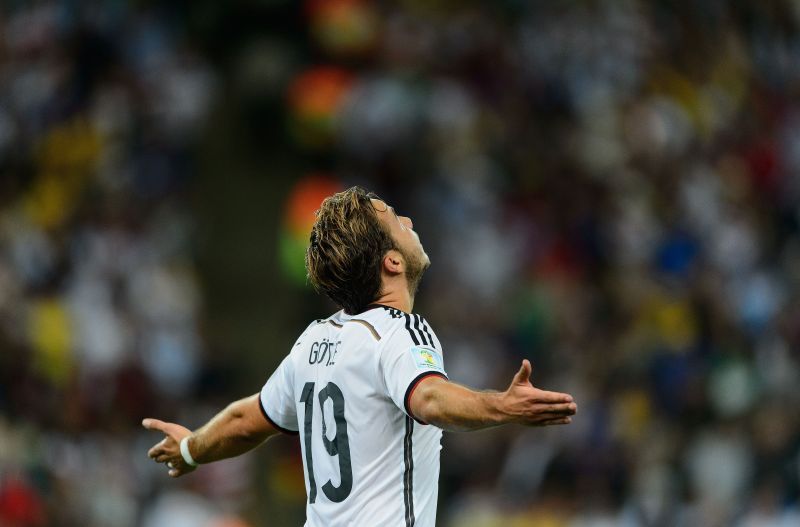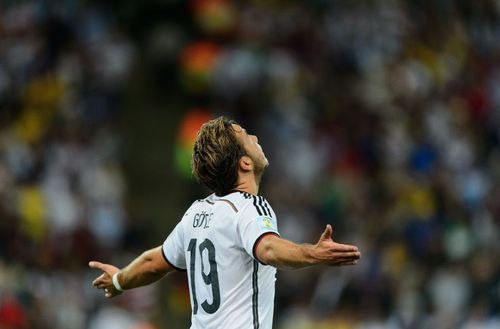
Where did it all go wrong for Mario Götze?

Mario Gotze in the greatest moment of his football career.
In 2014, Mario Götze scored the winner in the World Cup final after famously being told by Joachim Löw to "show you’re better than Messi." Six years and a terrible downward graph later, the former golden boy is entering a summer transfer window with no club and very few link-ups. So, what exactly happened? Well, a combination of bad luck and regrettable choices.
A wrong transfer move
The trajectory for the then-youngster already started taking a wrong turn one year before the night of his life when he slotted past Sergio Romero for the World Cup trophy. Yes, I'm talking about the transfer to Munich at a time when Mario Götze was at the top of his world.
By his own admission, Mario Götze probably regretted the move later, when he came back to Westfalenstadion in the summer of 2016. He was quoted saying, "Knowing what I know now, after three years, I’d probably not make the same decision again. But it was my decision, I’m not trying to hide from that. I wanted to take the risk."
Initially, the move seemed a match made in heaven, as has been the cases for other movers from Dortmund to Bayern, notably Hummels and Lewandowski.
Mario Götze wanted to be mentored by none other than Pep Guardiola, the man who revolutionized the false nine role that made Messi a legend in that position.
Mario Gotze- A misfit in the system
Turned out, Pep had other plans at the Allianz Arena. The Catalan didn't ever need a false nine. He had Mandzukic in his ranks, and one year later he brought Robert Lewandowski from Götze's former club. And suddenly Pep has no idea how to use Mario Götze.
Later, it was revealed by Uli Hoeness, Bayern club president, that Mario Götze's transfer was never intended by the incoming Catalan manager. His idea was to bring in a young Brazilian(read Neymar). However, Hoeness accepted, “In the past, we’d never done that well with such deals. As Pep wanted a similar player, we hit upon Götze.”
According to Guardiola's biographer Marti Perarnau, however, the Catalan went with the German on his squad list as Neymar’s replacement. “There was no player he devoted more time to,” Perarnau told a local newspaper. “
Götze did a lot better at Bayern than he was given credit for.” This was true to some extent, as Götze in his first season under Pep made more than 30 appearances in all competitions, This was, however, before his old partner from Dortmund, Lewandowski arrived.
A misdiagnosed issue and a long list of injuries
The most important factor in his fall from grace was the fact that Mario Götze had been suffering from long-term injuries since his teens.
The plethora of injuries began as early as the age of 19 when he was diagnosed with an inflammation of the pelvis – an overuse injury players dread because it takes so long to heal and it sidelined him for nearly a hundred days. A year later, he tore a thigh muscle during Dortmund’s Champions League semi-final against Real Madrid.
The timing of this injury didn't help him either, as he came off injured at Bernabeu, just one week after his impending transfer move to Munich came out in the media. Back then Lothar Matthaus, working as a pundit, argued the injury was psychosomatic and stress related, as the young playmaker had suddenly found himself at the centre of a media frenzy and, of course, abuse from the Dortmund supporters. The general notion among the neutrals was similar.
However, the following years showed how wrong the theory was because muscle injuries continued to haunt Mario Götze.
In 2015, he started for Germany in his then-favorite position as a false nine at Dublin against the Republic of Ireland. Half an hour into the game, came a challenge from James McCarthy, and that tore Mario Götze's groin muscle. He didn't play for 116 days after this.
In February 2017, BVB issued a press release. It explained that the source of Mario Götze’s recurring muscle injuries had been found – a metabolism disorder that was not only rare but also hard to detect.
The statement added that the player would be out for an indefinite period. Subsequent newspaper articles mentioned an illness called metabolic myopathy and speculated it could also account for the fact that Mario Götze seemed to struggle with weight gain despite working out more than most team-mates.
Former Dortmund manager Jurgen Klopp told Sky Sports Germany: “Mario Götze’s health issues are a logical explanation for the problems that have arisen over the past few years. I’m just glad this has now been discovered. Eventually, many people will hopefully have to apologize to him.”
What's next?
At the supposed peak age of 28 for a footballer, Mario Götze finds himself at the crossroads. The only speculation is he might consider a move to Monaco, where ex-Bayern coach Nico Kovac has recently joined, signing an agreement till 2023.
As a neutral football fan, I hope that Götze has put all his injuries behind, and will revive his career in the future. One more long-term injury can derail whatever's left of him, permanently.